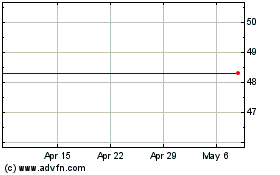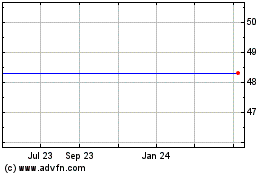Oil, Mining Companies Voice Opposition to Proposed Disclosure Rule
March 18 2020 - 3:54PM
Dow Jones News
By Dylan Tokar
A proposed rule mandating the disclosure of payments made by
oil, gas and mining companies to foreign governments has become the
target of anti-corruption advocates and even some businesses who
say it fails to align with international standards.
The updated rule, proposed by the U.S Securities and Exchange
Commission in December, seeks to ease the compliance burden the
disclosure obligations placed on the extractive industry, according
to the agency.
But some companies, in written comments to the SEC, have said
the proposal will do the opposite.
The multinational companies, including the U.K.'s BP PLC,
France's Total SA, Norway's state-controlled Equinor ASA and
Anglo-Australian miner Rio Tinto PLC, have said they support
disclosing payments on a contract-by-contract basis, as currently
required in Canada and Europe, instead of aggregating them on a
national level, as proposed by the SEC.
The deadline to submit public comments on the proposal was
Monday. The SEC said it would not make a final decision on the
proposal before April 24 to allow for additional comments due to
disruptions posed by the coronavirus pandemic.
The proposed rule is the third attempt by the SEC to implement a
controversial section of the Dodd-Frank Wall Street Reform and
Consumer Protection Act requiring extractive-industry companies to
disclose the payments they make to foreign governments. A first
version of the rule was adopted by the SEC in 2012.
Other countries, including Canada, Norway and members of the
European Union, have used the Dodd-Frank provision as a model for
legislation mandating similar disclosures by extractive industry
companies in their own countries.
After its adoption by the SEC in 2012, the rule became the
object of lobbying campaigns and a legal challenge by the American
Petroleum Institute. In 2013, a federal court in Washington, D.C.,
vacated the SEC's rule, saying the agency went too far in
interpreting the scope of the Dodd-Frank provision.
A second version of the rule was rescinded shortly after
Republicans gained control of the U.S. Senate in 2017. Republican
lawmakers continued to cite the potential costs of complying with
the rule, and argued that it could make companies less competitive
-- despite the disclosure obligations that had been enacted in
Europe and Canada.
The proposed revisions have led to a divergence between the
SEC's rule and the reporting requirements adopted abroad. That
discrepancy could place additional burdens on companies that have
to comply with multiple disclosure regimes, according to
organizations that submitted comments to the SEC.
"While the proposed rules are based on an approach similar to
the one taken by the EU, the currently proposed rules would
nonetheless create substantial differences between the two
regimes," Gine Wang-Reese, vice president of political and public
affairs at Equinor, wrote to the SEC. "[W]e question the need for
such a two-tiered test and its additional compliance burden."
Complying with the EU's contract-level requirement hasn't been
too burdensome, according to Total. The chief executive of the
company's Washington, D.C.-based lobbying arm, Francois Badoual,
wrote to the SEC that the company's internal cost of reporting was
about $200,000 per year. That cost covers about one month of work
by employees at the central finance level and one to two days of
data-verification work in each subsidiary.
Directors at anti-graft group Transparency International said in
a letter that the proposed rule could spur other countries to
eliminate their transparency laws. Similar groups also criticized
the payment thresholds requiring disclosure, saying many important
projects would fall through the cracks. The groups also objected to
exemptions for smaller and emerging growth companies, and for
situations in which a foreign law or a pre-existing contract
prohibits disclosure.
Smaller companies are often more likely to pay governments large
up-front bonuses to gain access to resources, the Carter Center, an
organization founded by former President Jimmy Carter, said in a
letter addressed to SEC Chairman Jay Clayton.
Write to Dylan Tokar at dylan.tokar@wsj.com
(END) Dow Jones Newswires
March 18, 2020 15:39 ET (19:39 GMT)
Copyright (c) 2020 Dow Jones & Company, Inc.
TOTAL (NYSE:TOT)
Historical Stock Chart
From Mar 2024 to Apr 2024

TOTAL (NYSE:TOT)
Historical Stock Chart
From Apr 2023 to Apr 2024
